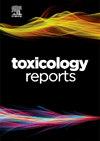Mechanisms of oral ciprofloxacin-induced depressive-like behavior and the potential benefit of lactulose: A correlation analysis
Q1 Environmental Science
引用次数: 0
Abstract
Prolonged administration of antibiotics may be associated with depression due to the potential risk of dysbiosis. Thus, the restoration of microbial balance, through administration of prebiotics, might overcome the problem. This study investigated the mechanisms of antibiotic-induced depression, which were explored through statistical correlation analysis. The potential benefit of lactulose, a prebiotic, on this behavioral disorder was further assessed. The rats were assigned to groups receiving 102.8 mg/kg ciprofloxacin daily for 1, 8, 15, or 22 days. A different group of rat was given the same regimen for 8 days accompanied with lactulose at 2056 mg/kg. Upon completion of ciprofloxacin administration, the rats were tested for depression-like behavior (forced swimming test, FST; and sucrose preference test, SPT). They were then sacrificed for biochemical assessment in the hippocampus and prefrontal cortex. The mechanism studies revealed significant correlation between SPT vs. serotonin in the hippocampus, and SPT vs. serotonin, cortisol, NF-κB in the prefrontal cortex. Meanwhile, FST was significantly correlated with serotonin in the hippocampus and the prefrontal cortex, while in the prefrontal cortex it was significantly correlated with cortisol, NF-κB, and IL-6. Based on the afore-mentioned results, it was found that lactulose improved FST by targeting serotonin in the hippocampus. This study indicate that ciprofloxacin induce depression-like behavior via modulation of several neurotransmitter system as well as proinflammatory cytokines in the hippocampus and prefrontal cortex. The results further suggest the potential of lactulose to improve this behavior.
口服环丙沙星诱导抑郁样行为的机制与乳果糖的潜在益处:相关分析
由于潜在的生态失调风险,长期使用抗生素可能与抑郁症有关。因此,恢复微生物平衡,通过管理益生元,可能会克服这个问题。本研究通过统计相关分析探讨抗生素性抑郁的机制。进一步评估了乳果糖(一种益生元)对这种行为障碍的潜在益处。大鼠被分成每天给药102.8 mg/kg环丙沙星的组,连续1、8、15和22天。另一组大鼠给予相同方案8天,同时给予乳果糖2056 mg/kg。环丙沙星给药结束后,对大鼠进行抑郁样行为测试(强迫游泳测试,FST;和蔗糖偏好试验(SPT)。然后,他们被处死以进行海马和前额皮质的生化评估。机制研究显示,SPT与海马中血清素、前额皮质中血清素、皮质醇、NF-κB有显著相关性。同时,FST在海马和前额皮质与血清素显著相关,在前额皮质与皮质醇、NF-κB、IL-6显著相关。基于上述结果,我们发现乳果糖通过靶向海马中的血清素改善FST。本研究表明环丙沙星通过调节海马和前额叶皮层的几种神经递质系统和促炎细胞因子诱导抑郁样行为。研究结果进一步表明,乳果糖有可能改善这种行为。
本文章由计算机程序翻译,如有差异,请以英文原文为准。
求助全文
约1分钟内获得全文
求助全文
来源期刊

Toxicology Reports
Environmental Science-Health, Toxicology and Mutagenesis
CiteScore
7.60
自引率
0.00%
发文量
228
审稿时长
11 weeks
 求助内容:
求助内容: 应助结果提醒方式:
应助结果提醒方式:


